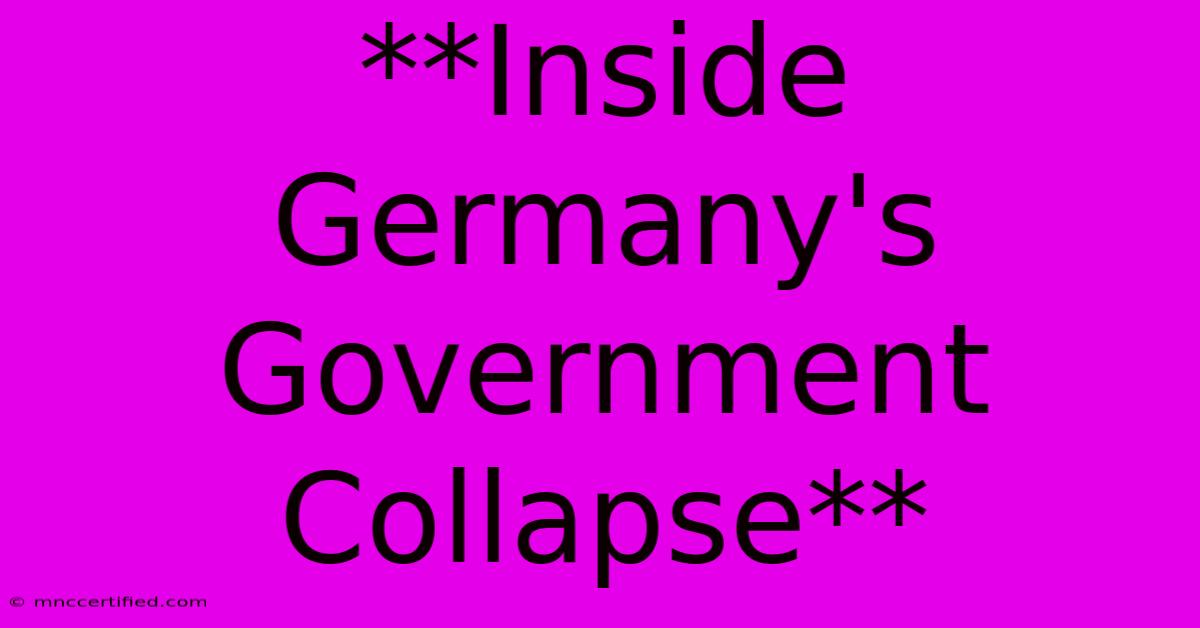**Inside Germany's Government Collapse**

Table of Contents
Inside Germany's Government Collapse: A Political Earthquake in Europe
The recent collapse of Germany's coalition government, led by Chancellor Olaf Scholz, has sent shockwaves through Europe. This unexpected turn of events, triggered by the FDP's withdrawal from the coalition, has raised questions about Germany's political landscape and its future role in the European Union.
The Seeds of Discord: A Clash of Ideologies
The cracks in the coalition, formed by the Social Democrats (SPD), the Greens, and the liberal Free Democratic Party (FDP), had been widening for months. Ideological differences, particularly on economic and social issues, became increasingly apparent. The FDP, known for its pro-business stance, clashed with the SPD and Greens on issues like energy policy, climate change, and social spending.
Key points of contention:
- Energy Policy: The FDP advocated for nuclear power, while the SPD and Greens pushed for a faster transition to renewable energy.
- Taxation: The FDP favored tax cuts, while the SPD and Greens pushed for higher taxes on the wealthy to fund social programs.
- Social Issues: The FDP opposed the introduction of a minimum wage, while the SPD and Greens supported it.
The FDP's Withdrawal: A Defining Moment
The tipping point came when the FDP, citing irreconcilable differences, announced its withdrawal from the coalition. This decision, a first in Germany's post-war history, effectively dissolved the government and triggered a new wave of political uncertainty.
The FDP's rationale:
- Lack of Consensus: The party argued that fundamental disagreements on key policy issues made it impossible to continue governing effectively.
- Policy Stalemate: The FDP felt that its positions on crucial issues were being ignored, leading to a policy stalemate.
- Loss of Public Trust: The FDP also expressed concerns about the coalition's declining public approval ratings, which they felt reflected a loss of trust in the government's ability to deliver.
The Fallout: A Scramble for Stability
The collapse of the government has left Germany in a state of political limbo. The country faces the prospect of early elections, adding to the uncertainty surrounding its political direction.
Key questions facing Germany:
- Stability and Leadership: Will the country be able to maintain stability and leadership in Europe during this period of political upheaval?
- Economic Impact: How will the political instability impact Germany's economy, already facing challenges due to the energy crisis and inflation?
- European Role: What will the collapse of the government mean for Germany's role in the European Union?
Beyond the Headlines: A Deeper Look
The collapse of Germany's government is more than just a political event. It reflects deeper societal divisions and anxieties about the future of the country. The rise of populism and nationalist sentiment in recent years has further fragmented the political landscape.
The broader context:
- Rising Inequality: The growing gap between the rich and poor has fueled social unrest and contributed to the rise of populist movements.
- Climate Change Concerns: Concerns about climate change and its impact on the environment have led to growing pressure for more ambitious climate action.
- Global Uncertainty: The ongoing war in Ukraine, the global energy crisis, and the economic slowdown have added to the sense of uncertainty and insecurity.
Looking Ahead: A New Chapter for Germany?
The collapse of Germany's government marks a turning point in the country's history. While the political landscape is currently uncertain, it also presents an opportunity for a fresh start.
Potential outcomes:
- Political Realignment: The collapse of the coalition could lead to a realignment of political forces, with new alliances emerging.
- Policy Shift: The next government may adopt a different set of priorities and policies, reflecting the changing political climate.
- Increased Public Engagement: The political turmoil could lead to increased public engagement in the political process.
The future of Germany, and its role in Europe, remains to be seen. However, the collapse of the government has highlighted the fragility of political alliances and the importance of addressing the underlying societal challenges that contribute to political instability. The coming months will be crucial for determining Germany's future direction, both domestically and internationally.

Thank you for visiting our website wich cover about **Inside Germany's Government Collapse** . We hope the information provided has been useful to you. Feel free to contact us if you have any questions or need further assistance. See you next time and dont miss to bookmark.
Featured Posts
-
Street Legal Golf Cart Insurance Florida
Nov 08, 2024
-
Review The Day Of The Jackal Tv Series 2024
Nov 08, 2024
-
Day Of The Jackal Remake What You Need To Know
Nov 08, 2024
-
What Are Business Uses Of Life Insurance
Nov 08, 2024
-
Day Of The Jackal Remakes Real Story
Nov 08, 2024